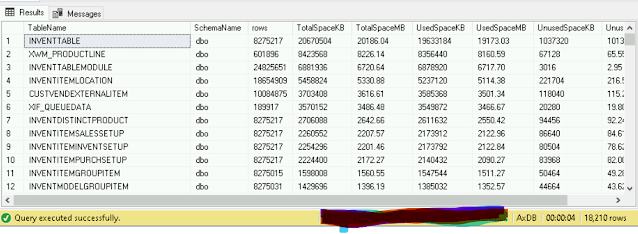Hi All,
In one of the projects, we got the requirements from client for analyze the size of the data after upload all the data, so that they can understand what the size of the data could be after 5-10 years.
1. Get size of all tables in database
This will help to get the complete list of tables with records and size.
SELECT
t.name AS TableName,
s.name AS SchemaName,
p.rows,
SUM(a.total_pages) * 8 AS TotalSpaceKB,
CAST(ROUND(((SUM(a.total_pages) * 8) / 1024.00), 2) AS NUMERIC(36, 2)) AS TotalSpaceMB,
SUM(a.used_pages) * 8 AS UsedSpaceKB,
CAST(ROUND(((SUM(a.used_pages) * 8) / 1024.00), 2) AS NUMERIC(36, 2)) AS UsedSpaceMB,
(SUM(a.total_pages) - SUM(a.used_pages)) * 8 AS UnusedSpaceKB,
CAST(ROUND(((SUM(a.total_pages) - SUM(a.used_pages)) * 8) / 1024.00, 2) AS NUMERIC(36, 2)) AS UnusedSpaceMB
FROM
sys.tables t
INNER JOIN
sys.indexes i ON t.object_id = i.object_id
INNER JOIN
sys.partitions p ON i.object_id = p.object_id AND i.index_id = p.index_id
INNER JOIN
sys.allocation_units a ON p.partition_id = a.container_id
LEFT OUTER JOIN
sys.schemas s ON t.schema_id = s.schema_id
WHERE
t.name NOT LIKE 'dt%'
AND t.is_ms_shipped = 0
AND i.object_id > 255
GROUP BY
t.name, s.name, p.rows
ORDER BY
TotalSpaceMB DESC, t.name
Output : 18210 rows
2. Get size of multiple tables in database
This will help to get the complete list of required multiple tables with records and size.
SELECT
t.name AS tablename, --INVENTTABLE,
s.name AS SchemaName, --NVENTTABLE,
p.rows, SUM(a.total_pages) * 8 AS TotalSpaceKB,
CAST(ROUND(((SUM(a.total_pages) * 8) / 1024.00), 2) AS NUMERIC(36, 2)) AS TotalSpaceMB,
SUM(a.used_pages) * 8 AS UsedSpaceKB,
CAST(ROUND(((SUM(a.used_pages) * 8) / 1024.00), 2) AS NUMERIC(36, 2)) AS UsedSpaceMB,
(SUM(a.total_pages) - SUM(a.used_pages)) * 8 AS UnusedSpaceKB,
CAST(ROUND(((SUM(a.total_pages) - SUM(a.used_pages)) * 8) / 1024.00, 2) AS NUMERIC(36, 2)) AS UnusedSpaceMB FROM
sys.tables t INNER JOIN sys.indexes i ON t.object_id = i.object_id INNER JOIN
sys.partitions p ON i.object_id = p.object_id AND i.index_id = p.index_id INNER JOIN
sys.allocation_units a ON p.partition_id = a.container_id LEFT OUTER JOIN
sys.schemas s ON t.schema_id = s.schema_id WHERE
t.name in ('InventTable',
'InventTableModule',
'MCRInventTable',
'PdsBatchAttribByItem',
'RetailInventTable',
'TMSInventEnabled',
'WHSInventEnabled',
'WHSInventTable',
'WHSPhysDimUOM')
AND t.is_ms_shipped = 0 AND i.object_id > 255 GROUP BY
t.name, s.name, p.rows
ORDER BY
TotalSpaceMB DESC, t.name

3.Get size of single table in database
This will help to get the complete required details of the tables with records and size.
SELECT
t.name AS TableName,
s.name AS SchemaName,
p.rows,
SUM(a.total_pages) * 8 AS TotalSpaceKB,
CAST(ROUND(((SUM(a.total_pages) * 8) / 1024.00), 2) AS NUMERIC(36, 2)) AS TotalSpaceMB,
SUM(a.used_pages) * 8 AS UsedSpaceKB,
CAST(ROUND(((SUM(a.used_pages) * 8) / 1024.00), 2) AS NUMERIC(36, 2)) AS UsedSpaceMB,
(SUM(a.total_pages) - SUM(a.used_pages)) * 8 AS UnusedSpaceKB,
CAST(ROUND(((SUM(a.total_pages) - SUM(a.used_pages)) * 8) / 1024.00, 2) AS NUMERIC(36, 2)) AS UnusedSpaceMB
FROM
sys.tables t
INNER JOIN
sys.indexes i ON t.object_id = i.object_id
INNER JOIN
sys.partitions p ON i.object_id = p.object_id AND i.index_id = p.index_id
INNER JOIN
sys.allocation_units a ON p.partition_id = a.container_id
LEFT OUTER JOIN
sys.schemas s ON t.schema_id = s.schema_id
WHERE
t.name LIKE 'CustTable'
AND t.is_ms_shipped = 0
AND i.object_id > 255
GROUP BY
t.name, s.name, p.rows
ORDER BY
TotalSpaceMB DESC, t.name
Output:
Naresh Dharanikota


No comments:
Post a Comment